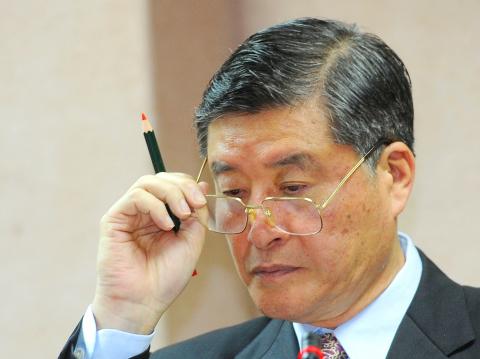Taiwan will not share information gathered by its new early-warning surveillance radar system with the US after the system is completed by the end of the year, a defense official said yesterday.
Located at a military base at Leshan (樂山) in Hsinchu County, the long-range system will be a closed network and the military “will not offer” information collected by it to the US, said Lieutenant General Liu Shi-lay (劉溪烈), an official with the unit at the Ministry of National Defense responsible for communication, electronics and information.
Liu made the remarks in response to concerns raised by Chinese Nationalist Party (KMT) Legislator Lu Shiow-yen (盧秀燕) that the military would provide information collected by the radar system to the US.

Photo: Liu Hsin-de, Taipei Times
At a hearing of the legislature’s Foreign Affairs and National Defense Committee, Lu also expressed concern that the system, which Taiwan purchased from the US, would be more beneficial to Washington than to Taipei.
Lu said the information collected by the radar system will be more valuable for the US, in the event of missile attacks by China.
However, the ministry has said that the radar system is necessary to help strengthen Taiwan’s combat readiness in case of Chinese attack, given that China currently has about 1,600 missiles targeting Taiwan.
On the possibility that the US may be able to intercept data collected by the system, Liu said the US would be unable to access any information unless Taiwan shares it.
At the same session, Minister of National Defense Kao Hua-chu (高華柱) said Taiwan would purchase two Oliver Hazard Perry-Class frigates from the US in 2014, as part of its efforts to revive the navy’s aging fleet.
Kao said the decommissioned frigates would be purchased with key onboard equipment such as the SQR-19 Towed Array Sonar system, which allows long-range passive detection of enemy submarines.
“This is necessary,” Kao said responding to questions by KMT Legislator Lin Yu-fang (林郁方) on the issue of buying the two frigates from the US for more than NT$7 billion (US$239.36 million).
Lin also asked about the progress of a project to replace the engine blades on Taiwan’s fleet of Mirage 2000-5 combat aircraft.
Kao said the project is progressing and will be completed by the end of next year.
When asked whether the problem with the engine blades was related to the Mirage fighter jet crash in France last month that killed a Taiwanese pilot, Kao said the cause of the accident is still under investigation. Kao added that he had asked the air force to obtain information on Mirage fighter crashes throughout the world over the past five years to help investigate the death of the pilot, Colonel Wang Tung-yi (王同義), who was killed when his plane crashed in France during a training mission.
Kao also confirmed that a Taiwanese shipbuilding company commissioned by the navy had begun building a prototype missile boat, but declined to discuss any further details of the project.
He was answering Democratic Progressive Party Legislator Lin Chia-lung (林佳龍)’s question on whether the prototype will be outfitted with locally developed anti-ship missiles the Hsiung Feng (Brave Wind) III and Hsiung Feng II, as reported by local media.

Palauan President Surangel Whipps Jr arrived in Taiwan last night to kick off his first visit to the country since beginning his second term earlier this year. After arriving at Taoyuan International Airport at around 6:30 pm, Whipps and his delegation were welcomed by Minister of Foreign Affairs Lin Chia-lung (林佳龍). Speaking to gathered media, the Palauan leader said he was excited and honored to be back in Taiwan on his first state visit to Taiwan since he was sworn in this January. Among those traveling with Whipps is Minister of State Gustav N. Aitaro, Public Infrastructure

President William Lai (賴清德) yesterday thanked Palau for its continued support of Taiwan's international participation, as Taipei was once again excluded from the World Health Assembly (WHA) currently taking place in Switzerland. "Palau has never stopped voicing support for Taiwan" in the UN General Assembly, the WHO and other UN-affiliated agencies, Lai said during a bilateral meeting with visiting Palau President Surangel Whipps Jr. "We have been profoundly touched by these endorsements," Lai said, praising the Pacific island nation's firm support as "courageous." Lai's remarks came as Taiwan was excluded for the ninth consecutive year from the WHA, which is being held in

RESOLUTIONS DEBATE: Taiwan’s allies said that UN and WHA resolutions cited by China and other nations ‘do not determine Taiwan’s participation in WHO activities’ A proposal to invite Taiwan to this year’s World Health Assembly (WHA) was rejected on Monday, resulting in Taipei’s absence from the annual meeting for a ninth consecutive year, although partners spoke up for Taiwan’s participation at the first day of the meeting. The first agenda item after the opening was a “two-on-two debate” on a proposal to invite Taiwan to participate at the WHA as an observer. Similar to previous years, two countries made statements in favor of the proposal, while two others expressed their opposition. Philippine Secretary of Health Teodoro Herbosa, president of the 78th WHA, accepted the WHA General Committee’s

At least three people died and more than a dozen were injured yesterday afternoon when a vehicle struck a group of pedestrians in New Taipei City’s Sansia District (三峽). The incident happened at about 4pm when a car rammed into pedestrians at an intersection near Bei Da Elementary School. Witnesses said the sedan, being driven at a high speed, ran a red light, knocking scooters out of the way and hitting students crossing the road before careening into a median near the intersection of Guocheng and Guoguang streets. The incident resulted in three deaths and 13 injuries, including the driver, a 78-year-old man